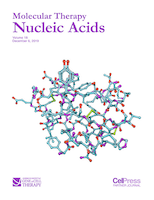
NUCLEOSIDES NUCLEOTIDES & NUCLEIC ACIDS
metrics 2024
Fostering Innovation in Molecular Biology
Introduction
NUCLEOSIDES NUCLEOTIDES & NUCLEIC ACIDS is a vital academic journal published by Taylor & Francis Inc, dedicated to the intricate and evolving domains of biochemistry, genetics, and molecular medicine. With an ISSN of 1525-7770 and E-ISSN of 1532-2335, this journal aims to provide a comprehensive platform for the dissemination of research findings, reviews, and methodologies related to nucleosides, nucleotides, and nucleic acids. As a research journal thriving since its inception in 2000, it reflects a diverse spectrum of studies crucial for advancing knowledge in biochemistry (ranked Q4) and genetics (Q4), while also achieving Q3 status in medicine (miscellaneous). Despite its current standing in the quartiles and Scopus rankings indicative of an emergent trajectory, the journal retains significant relevance for those delving into interdisciplinary research that intersects these fields. Researchers, professionals, and students alike can explore a plethora of original research articles, thought-provoking reviews, and updates on pioneering advances that shape our understanding of molecular biology. With its unwavering commitment to scholarly excellence, NUCLEOSIDES NUCLEOTIDES & NUCLEIC ACIDS continues to be an essential resource for those aiming to contribute to and stay informed about this pivotal area of scientific inquiry.
Metrics 2024
 0.26
0.26 1.10
1.10 1.20
1.20 53
53Metrics History
Rank 2024
Scopus
IF (Web Of Science)
JCI (Web Of Science)
Quartile History
Similar Journals

Biochemistry and Cell Biology
Innovating research for a deeper understanding of life at the molecular level.Biochemistry and Cell Biology, published by Canadian Science Publishing, is a prestigious journal that has been instrumental in advancing the fields of biochemistry, molecular biology, and cell biology since its inception in 1986. With an impressive scope spanning innovative research findings to comprehensive reviews, this journal serves as a vital resource for researchers, professionals, and students alike. Currently positioned in the Q2 quartile in Biochemistry and Q3 quartiles in both Cell Biology and Molecular Biology, it reflects a robust contribution to scientific discourse, placing it among reputable publications in its field. The journal boasts notable rankings within the Scopus database, highlighting its impact and relevance, and continues to be a valuable platform for disseminating pivotal research. By providing access to a wide array of articles, the journal remains committed to fostering knowledge and collaboration in the scientific community.

Biomolecules
Empowering the scientific community with accessible biomolecular research.Biomolecules is a prestigious, peer-reviewed journal published by MDPI that has been dedicated to advancing the field of biochemical research since its launch in 2011. With an impressive impact factor positioning it in Q1 for Biochemistry and Q2 for Molecular Biology as of 2023, this journal serves as a vital platform for disseminating high-quality research findings related to biological macromolecules, including proteins, nucleic acids, and carbohydrates. Operating as an Open Access journal, it ensures that vital research is accessible to all, furthering knowledge dissemination and collaboration within the scientific community. Located in Basel, Switzerland, the journal has established a significant presence in major academic databases, holding commendable Scopus rankings in both Biochemistry and Molecular Biology. Researchers, professionals, and students will find Biomolecules an invaluable resource for cutting-edge research, reviews, and insights in the rapidly evolving domains of biochemistry and molecular biology.

CELLULAR & MOLECULAR BIOLOGY LETTERS
Unlocking the Secrets of Life at the Molecular LevelCELLULAR & MOLECULAR BIOLOGY LETTERS, published by BMC, is a premier open-access journal dedicated to disseminating high-quality research in the fields of Biochemistry, Cell Biology, and Molecular Biology. Established in 1996, the journal has emerged as a leader in its domain, boasting an impressive Q1 ranking across three critical categories as of 2023, reflecting its significant impact within the scientific community. With an ISSN of 1425-8153 and an E-ISSN of 1689-1392, it offers accessible research findings to a global audience, having been open access since 2013. Situated in the United Kingdom, at CAMPUS, 4 CRINAN ST, LONDON N1 9XW, the journal continues to serve as a vital resource for researchers, professionals, and students, contributing to advancements in the understanding of cellular and molecular processes. By providing a platform for original research, reviews, and short communications, CELLULAR & MOLECULAR BIOLOGY LETTERS plays a crucial role in fostering dialogue and collaboration within the scientific community.

MOLECULAR GENETICS AND GENOMICS
Unraveling the Complexities of Life at the Molecular LevelMOLECULAR GENETICS AND GENOMICS is a distinguished journal published by SPRINGER HEIDELBERG that serves as a pivotal platform for the communication of cutting-edge research and developments in the fields of genetics, molecular biology, and medicine. With an ISSN of 1617-4615 and an E-ISSN of 1617-4623, this journal has established itself since its inception in 1994 as a significant resource for researchers aiming to explore the complexities of genetic interactions and their implications in various biological systems. The journal is indexed in Scopus, with respectable rankings in the Genetics, Molecular Biology, and Biochemistry categories, showcasing its position within the academic community. It is categorized in the 2023 rankings as Q3 in Genetics, Q2 in Medicine (miscellaneous), and Q3 in Molecular Biology, indicating its relevance and quality in the scientific discourse. The journal also promotes open access, ensuring that researchers and professionals can easily share and advance knowledge in the rapidly evolving disciplines of molecular genetics and genomics. As the journal continues to bridge the gap between experimental and theoretical research, it presents a vital space for innovation, fostering collaborations and scholarly exchange among its readership.

Human Genomics
Elevating Genomic Research to New HeightsHuman Genomics, published by BMC, is a leading open-access journal dedicated to advancing the field of genomics and its applications in health and disease. Since its inception in 2003, the journal has provided a vital platform for researchers to disseminate groundbreaking findings related to genetic research, contributing significantly to areas such as Drug Discovery, Genetics, Molecular Biology, and Molecular Medicine, as reflected in its Q1 and Q2 quartile rankings throughout 2023. With an ISSN of 1473-9542 and an E-ISSN of 1479-7364, Human Genomics not only delivers high-quality, peer-reviewed research but also ensures accessibility to a broader audience, empowering professionals, students, and academics to stay at the forefront of genomic science. Through its rigorous editorial standards and impactful publications, the journal fosters a collaborative environment for innovative research across the globe from its base in the United Kingdom. By promoting open access since its launch, Human Genomics continues to enhance the visibility and impact of genetic studies, making it an essential resource for anyone involved in the rapidly evolving field of human genomics.

DNA AND CELL BIOLOGY
Empowering Scientific Progress Through Rigorous ResearchDNA AND CELL BIOLOGY, published by Mary Ann Liebert, Inc, is a distinguished journal in the realms of cell biology, genetics, and molecular biology, holding a notable position in its Q3 and Q2 quartile rankings across multiple academic categories as of 2023. With an ISSN of 1044-5498 and an E-ISSN of 1557-7430, this journal has been a pivotal platform for the dissemination of cutting-edge research since its inception in 1990, extending its coverage through 2024. Situated in the United States, the journal offers high-quality peer-reviewed articles, exploring significant advancements in biological sciences while fostering interdisciplinary collaborations within the research community. Though it currently does not offer open access, subscribed institutions and individual readers benefit from its rich repository of knowledge. The journal's rigorous standards and impactful content make it an essential resource for researchers, professionals, and students alike, aiming to stay at the forefront of discoveries influencing DNA and cellular dynamics.

JOURNAL OF GENE MEDICINE
Pioneering Research in Genetics and Drug DiscoveryThe Journal of Gene Medicine, published by Wiley, stands as a pivotal resource in the field of gene therapy and molecular medicine, with a rich history of dissemination of impactful research since its inception in 1998. With an ISSN of 1099-498X and an E-ISSN of 1521-2254, this esteemed journal plays a crucial role in advancing our understanding of genetics and drug discovery, reflected in its impressive 2023 Scopus rankings where it holds a Q2 classification in Drug Discovery and Q3 in several genetics-related categories. The journal aims to facilitate the exchange of high-quality research findings that bridge the gap between laboratory and clinical applications, making it an essential platform for researchers, academics, and healthcare professionals committed to the forefront of genetic innovation. Although it does not currently offer open access options, its reputation for rigorous peer review ensures that all published work meets the highest academic standards, providing a reliable reference for scientific inquiry in the United States and beyond. As the field rapidly evolves, the Journal of Gene Medicine remains at the helm, guiding future discoveries with its influential publications and comprehensive insights.

MOLECULAR AND CELLULAR BIOLOGY
Driving Innovation in Molecular and Cellular ScienceMOLECULAR AND CELLULAR BIOLOGY, published by TAYLOR & FRANCIS INC, stands as a preeminent platform for researchers, professionals, and students engaged in the dynamic field of molecular and cellular biology. Established in 1981 and ongoing into 2024, the journal features cutting-edge research that spans across vital sub-disciplines, garnering a strong impact in its contributions to the scientific community. With an impressive Q2 ranking in Cell Biology and Q1 ranking in Molecular Biology for 2023, it consistently publishes high-quality articles that reflect the latest advancements and discoveries within the field. The journal is particularly well-regarded for its rigorous peer-review process and commitment to scientific excellence, making it an invaluable resource for those seeking to deepen their understanding of molecular mechanisms and cellular processes. Although not open access, the journal offers diverse access options for researchers to reach the latest findings. By maintaining a strong focus on biochemistry, genetics, and molecular biology, MOLECULAR AND CELLULAR BIOLOGY remains essential reading for anyone looking to contribute to or stay informed about significant developments within this pivotal area of study.

Molecular Therapy Nucleic Acids
Exploring the frontiers of drug discovery with nucleic acids.Molecular Therapy Nucleic Acids is a premier open-access journal published by CELL PRESS, dedicated to advancing the field of molecular medicine through the innovative application of nucleic acid-based therapies. Since its inception in 2012, this journal has become an essential resource for researchers and professionals in drug discovery and molecular medicine, reflected in its status as a Q1 journal in both categories for 2023. With a notable impact factor and high rankings in Scopus, including #8 out of 157 in Drug Discovery and #16 out of 178 in Molecular Medicine, it serves to disseminate groundbreaking research and foster collaborations among scientists worldwide. The journal's comprehensive scope encompasses a wide variety of topics, including gene therapy, RNA interference, and CRISPR technology, ensuring that it remains at the forefront of scientific excellence. With open access availability, Molecular Therapy Nucleic Acids actively promotes the widespread dissemination of knowledge, making its crucial insights accessible to students, researchers, and industry professionals alike.

IUBMB LIFE
Advancing the Frontiers of Life SciencesIUBMB LIFE is a prestigious, peer-reviewed journal published by WILEY, dedicated to advancing the fields of biochemistry, molecular biology, and cell biology. With an impressive impact factor and consistently ranked in the Q1 and Q2 categories across multiple relevant disciplines—including Biochemistry, Genetics, and Clinical Biochemistry—this journal has established itself as a leading platform for disseminating innovative research and critical reviews that propel scientific discovery. The journal spans a converged publication period from 1999 to 2024, providing comprehensive insights into the dynamic landscape of biochemical research. Researchers, professionals, and students alike are invited to explore its Open Access options, ensuring that groundbreaking studies are accessible to a global audience. As it continues to shape the future of life sciences, IUBMB LIFE remains a vital resource for those seeking to enrich their understanding and contribute to these rapidly evolving fields.